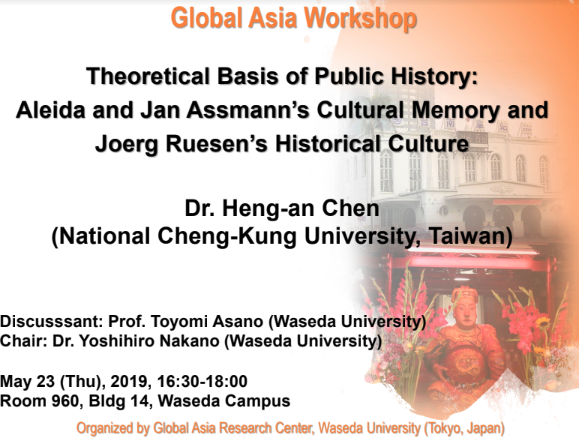Theoretical Basis of Public History: Aleida and Jan Assmann’s Cultural Memory and Joerg Ruesen’s Historical Culture (Workshop on May 23)

Workshop Title: Theoretical Basis of Public History: Aleida and Jan Assmann’s Cultural Memory and Joerg Ruesen’s Historical Culture
Speaker: Dr. Heng-an Chen (National Cheng-Kung University, Taiwan)
Abstract: Memory has become a central concern in contemporary societies in a global scale. How academic historians should respond to this “Memory Boom”? The theoretical question raised is whether “memory” an “history” can be as radically separated as historians have thought. To further discuss this issue, I will introduce two concepts, i.e. Aleida and Jan Assmann’s “Cultural Memory” and Ruesen’s “Historical Culture”, and compare their similarities and differences. Discussion of these issues leads to analysis of advantages and difficulties of applying these concepts to the study of personal memory, collective memory and even national memory, or to the works of transitional justice and reconciliation. At last I will give three examples from Taiwan, especially from my university, and the city where the university is located. First, I will introduce a bronze statue of Koxinga (鄭成功) on the Tainan Station Square. Our University is named after his name. Second, a university square naming dispute, related to an alumni in the “White Terror” period (1949-1991). Third, I will introduce our “university history room” in NCKU museum, and discuss a little about how to communicate the issues about unhappy or even difficult pasts.
Organized by Global Asia Research Center, Waseda University (Tokyo, Japan)
Discussant: Prof. Toyomi Asano (Waseda University)
Chair: Dr. Yoshihiro Nakano (Waseda University)
May 23 (Thu), 2019, 16:30-18:00
Room 960, Bldg 14, Waseda Campus
